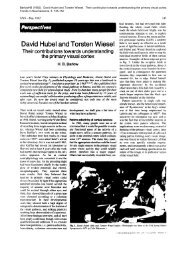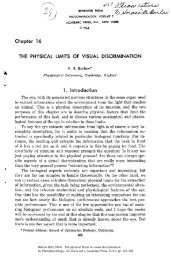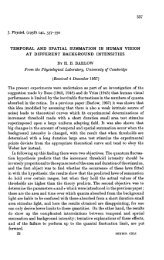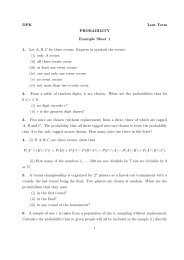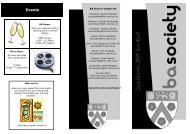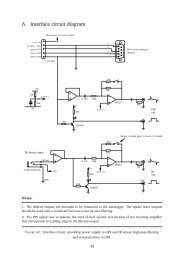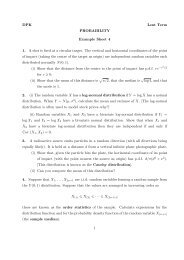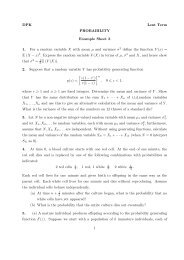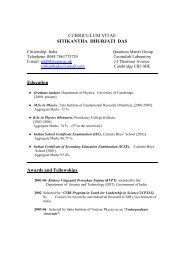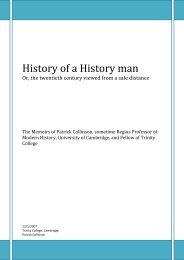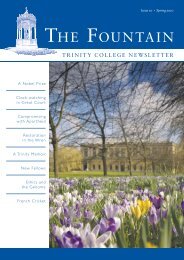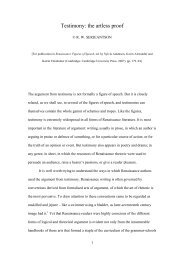Hume's General Rules - Serjeantson
Hume's General Rules - Serjeantson
Hume's General Rules - Serjeantson
You also want an ePaper? Increase the reach of your titles
YUMPU automatically turns print PDFs into web optimized ePapers that Google loves.
<strong>Serjeantson</strong>-4<br />
and Discours de la méthode (‘Discourse on method’, 1637); 8 Baruch de Spinoza’s<br />
Tractatus de emendatione intellectus (‘Treatise on the emendation of the intellect’, c.<br />
1658); Nicolas Malebranche’s Recherche de la vérité (1674-75); Ehrenfried Walter<br />
von Tschirnhaus’s Medicina mentis (‘Medicine of the mind’, 1695); 9 John Locke’s<br />
Essay Concerning Humane Understanding (1690) and Gottfried Wilhelm von<br />
Leibniz’s dialogic commentary upon it, the Nouveaux essais sur l'entendement<br />
humain (‘New essays on human understanding’; written between 1703 and 1705, but<br />
first published only in 1765, and therefore unknown to Hume when he wrote the<br />
Treatise); George Berkeley’s Treatise Concerning the Principles of Human<br />
Knowledge (1710, 1734), and indeed Hume’s Treatise of Human Nature. By<br />
definition--since they are in good part written in reaction against it--such works do not<br />
fit neatly into the disciplinary categories that the dominant Aristotelian philosophy of<br />
the sixteenth and earlier seventeenth centuries was so effectively structured by.<br />
Nonetheless all of these works, as well as drawing upon natural philosophy, faculty<br />
psychology, and even medicine, take on a great part of their significance when seen in<br />
the context of the discipline of logic. 10<br />
It was in discipline of logic that questions about reason and the nature of<br />
knowledge were treated in conventional school-philosophy. It is thus the discipline of<br />
logic that should underlie our attempts to understand the significance in the history of<br />
philosophy of the emphasis that emerged in the later seventeenth century on ‘human<br />
understanding’. Indeed, this emphasis developed in part from works of logic<br />
8 On Descartes’s Regulae as a form of logic, see Eric Palmer, ‘Descartes’s <strong>Rules</strong> and the workings of<br />
the mind’, in Logic and the Workings of the Mind, pp. 269-82.<br />
9 Ehrenfried Walther von Tschirnhaus, Medicina mentis (Leipzig: Thomas Fritsch, 1695, 2nd ed.). On<br />
this work, see C. A. van Peursen, ‘E. W. von Tschirnhaus and the ars inveniendi’, Journal of the<br />
History of Ideas, 54 (1993): 395-410; Martin Schönfeld, ‘Dogmatic metaphysics and Tschirnhaus’s<br />
methodology’, Journal of the History of Philosophy, 36 (1998): 57-76; Catherine Wilson, 'Between<br />
medicina mentis and medical materialism', in Logic and the Workings of the Mind, pp. 251-68.<br />
10 This point is made effectively by Lorne Falkenstein and Patricia Easton, ‘Preface’, in Logic and the<br />
Workings of the Mind, pp. i-vii, pp. ii-iii. See also Norman Fiering, Moral Philosophy at Seventeenth-<br />
Century Harvard: A Discipline in Transition (Chapel Hill: University of North Carolina Press, 1981), p.<br />
240 n. 3.



